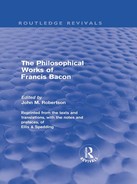Book Description
First published in 1905, this reissued edition of The Philosophical Works of Francis Bacon is an edited collection based upon the definitive seven volume edition of 1857, translated and prefaced by Robert Leslie Ellis and James Spedding.
Of great historical, philosophical and scientific interest, this collection brings together translations of Bacon’s most important works, including the Novum Organum, the De Augmentis Scientarium, the Parasceve, and the De Principiis atque Originibus, as well as works originally written in English, such as the Valerius Terminus and the Filum Labyrinthi. The reissue offers a comprehensive and provocative collection of the key writings of the man we now consider to be the father of Empiricism who popularised inductive methodologies for scientific inquiry. All works include prefaces by Robert Leslie Ellis and James Spedding, and the collection includes an introductory note from the editor John M. Robertson.
Table of Contents
- Cover
- Half Title
- Full Title
- Copyright
- EDITOR'S PREFACE
- EDITOR'S INTRODUCTION
- CONTENTS
- LIFE OF THE HONOURABLE AUTHOR
- GENERAL PREFACE TO BACON'S PHILOSOPHICAL WORKS
- THE PROFICIENCE AND ADVANCEMENT OF LEARNING, DIVINE AND HUMAN—
- VALERIUS TERMINUS (Fragments)—
- FILUM LABYRINTHI SIVE FORMULA INQUISITIONIS (Fragment)—
- THE GREAT INSTAURATION. (Translation)—
- THE SECOND PART OF THE WORK, WHICH IS CALLED THE NEW ORGANON, or TRUE DIRECTIONS CONCERNING THE INTERPRETATION OF NATURE—
- PARASCEVE, OR PREPARATIVE TOWARDS A NATURAL AND EXPERIMENTAL HISTORY—
- DE DIGNIT ATE ET AUGMENTIS SCIENTIA RUM. Translation of Books II–IX—
- ON PRINCIPLES AND ORIGINS, according to the Fables of Cupid and Cœlum, etc. (Translation of De Principiis atque Originibus, etc.)—
- A DESCRIPTION OF THE INTELLECTUAL GLOBE. (Translation of the Descriptio Globi Intellectualis)—
- THEORY OF THE EARTH. (Translation of the Thema Cœli)
- ESSAYS, OR COUNCILS CIVIL AND MORAL—
- PREFACE
- THE EPISTLE DEDICATORY
- Essay 1. Of Truth
- 2. Of Death
- 3. Of Unity in Religion
- 4. Of Revenge
- 5. Of Adversity
- 6. Of Simulation and Dissimulation
- 7. Of Parents and Children
- 8. Of Marriage and Single Life
- 9. Of Envy
- 10. Of Love
- 11. Of Great Place
- 12. Of Boldness
- 13. Of Goodness and Goodness of Nature
- 14. Of Nobility
- 15. Of Seditions and Troubles
- 16. Of Atheism
- 17. Of Superstition
- 18. Of Travel
- 19. Of Empire
- 20. Of Counsel
- 21. Of Delays
- 22. Of Cunning
- 23. Of Wisdom for a Man's Self
- 24. Of Innovations
- 25. Of Dispatch
- 26. Of Seeming Wise
- 27. Of Friendship
- 28. Of Expense
- 29. Of the True Greatness of Kingdoms and Estates
- 30. Of Regiment of Health
- 31. Of Suspicion
- 32. Of Discourse
- 33. Of Plantations
- 34. Of Riches
- 35. Of Prophecies
- 36. Of Ambition
- 37. Of Masques and Triumphs
- 38. Of Nature in Men
- 39. Of Custom and Education
- 40. Of Fortune
- 41. Of Usury
- 42. Of Youth and Age
- 43. Of Beauty
- 44. Of Deformity
- 45. Of Building
- 46. Of Gardens
- 47. Of Negotiating
- 48. Of Followers and Friends
- 49. Of Suitors
- 50. Of Studies
- 51. Of Faction
- 52. Of Ceremonies and Respects
- 53. Of Praise
- 54. Of Vain Glory
- 55. Of Honour and Reputation
- 56. Of Judicature
- 57. Of Anger
- 58. Of Vicissitude of Things
- APPENDIX TO THE ESSAYS—
- WISDOM OF THE ANCIENTS. (Translation of the De Sapientia Veterum)—
- PREFACE
- Author's Dedication
- Author's Preface
- 1. Cassandra, or Plainness of Speech
- 2. Typhon, or The Rebel
- 3. The Cyclopes, or Ministers of Terror
- 4. Narcissus, or Self-Love
- 5. Styx, or Treaties
- 6. Pan, or Nature
- 7. Perseus, or War
- 8. Endymion, or The Favourite
- 9. The Sister of The Giants, or Fame
- 10. Actæon and Pentheus, or Curiosity
- 11. Orpheus, or Philosophy
- 12. Cœlum, or The Origins of Things
- 13. Proteus, or Matter
- 14. Memnon, or The Early Ripe
- 15. Tithonus, or Satiety
- 16. Juno's Suitor, or Dishonour
- 17. Cupid, or The Atom
- 18. Diomedes, or Religious Zeal
- 19. Dædalus, or The Mechanic
- 20. Erichthonius, or Imposture
- 21. Deucalion, or Restoration
- 22. Nemesis, or The Vicissitude of Things
- 23. Achelous, or The Battle
- 24. Dionysus, or Desire
- 25. Atalanta, or Profit
- 26. Prometheus, or The State of Man
- 27. The Flight of Icarus : also Scylla and Charybdis, or The Middle Way
- 28. Sphinx, or Science
- 29. Proserpina, or Spirit
- 30. Metis, or Counsel
- 31. The Sirens, or Pleasure
- APOPHTHEGMS—
- INDEX
